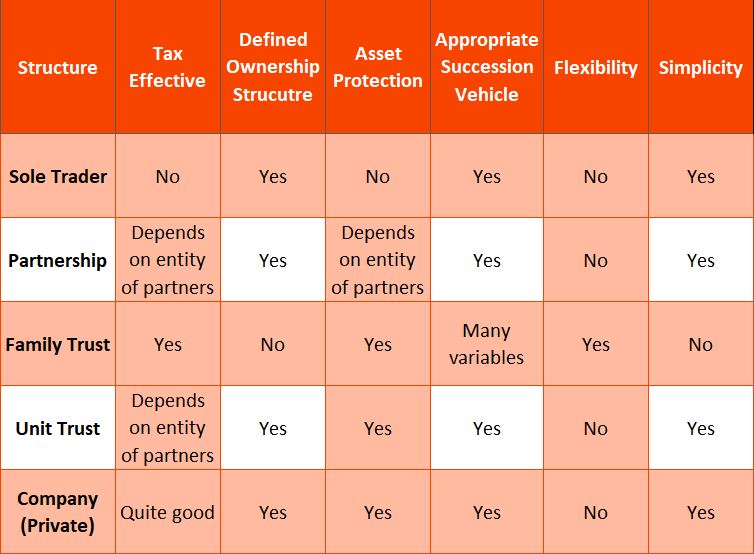In Establishing a Consultancy Business in Mining & Resources Part 1 we set out various important issues for your consideration. Here we expand on three of them: asset protection & tax minimisation, funding, and employment law issues.
1. Asset protection and tax minimisation
Most consultancies are set up as a sole trader, partnership, company or trust (family or unit) business entity (or structure). Each offers combinations in terms of:
- simplicity or complexity
- asset protection or asset risk
- tax minimisation or not
- cost of operating structure
In deciding on a structure you will need to take legal and accounting advice to weigh up the costs and benefits of each. This table compares the advantages and disadvantages of the various structures.
 Sometimes by mixing the structures the disadvantages of one structure can be minimised. For example, the business can be operated by a unit trust. The units in that trust can be owned by various family trusts. This structure can allow the income of the business owned by the unit trust to be spread widely.
Sometimes by mixing the structures the disadvantages of one structure can be minimised. For example, the business can be operated by a unit trust. The units in that trust can be owned by various family trusts. This structure can allow the income of the business owned by the unit trust to be spread widely.
Another example is that a partnership can be a partnership of trusts. This can give some asset protection and better tax‑effectiveness. As you can see, it is essential to take good legal and accounting advice when setting up your structure.
2. Funding
Funding can be by way of equity (contribution by stakeholders), loans from stakeholders or related parties, or loans from financial institutions. The appropriate funding mix for your situation will depend on various factors. You will need to take legal and accounting advice to determine this. The basic issues to be aware of are these:
- Banks usually won’t lend to a small business without real estate security and personal guarantees. This will usually be provided by the stakeholders. If there is more than one stakeholder you will need agreements between the stakeholders as to what happens if those personal guarantees or real estate security are ever called upon.
- Loan funds provided by stakeholders themselves should be provided as a secured loan to the business.
- Loan funds from stakeholders should match the stakeholding.
- Accounting advice should be sought in deciding whether loan funds or equity funds should be provided as there are various factors which would determine the best mix tax‑wise and asset protection‑wise.
3. Employment Law issues
If you have employees, you should have written agreements with those employees. You should take legal advice regarding this. You should also be aware of basic employment law rules, such as:
- The National Employment Standards (NES) in the Fair Work Act prescribe employees’ minimum entitlements such as leave, weekly hours and notice.
- Employees may be governed by Modern Awards which prescribe certain terms and conditions in addition to the NES.
- You must give every employee upon commencing employment a Fair Work Information Statement.
- There are specific rules and law concerning redundancy, resignation and dismissal and if you as the employer get this process wrong, you may have to defend an action in the Fair Work Commission.
- Caution must be taken in relation to casual workers as in certain circumstances a casual employee may be entitled to some or all of the entitlements of a permanent employee.
- In some circumstances it may be more effective for your and the other party to have a contractual relationship, not an employment relationship. This is a very complex area of the law and you should seek legal and accounting advice as to what you can and cannot do in this scenario.
As you can see, there is a lot to consider. If you would like to find out more about setting up a consultancy business in mining and resources or require other legal support, please contact me, Ian Hillhouse, or Craig Hong on 61 (0)7 3007 2000 or contact@resourcesunearthed.com.au
Resources Unearthed is a solutions hub that provides integrated financial, legal, property and accounting & business advisory services for executives, professionals and business owners in the mining and resources sectors.
No responsibility will be taken by Hillhouse Legal Partners for loss occasioned directly or indirectly to any person acting or refraining from acting wholly or partially upon or as a result of the material in this publication.










